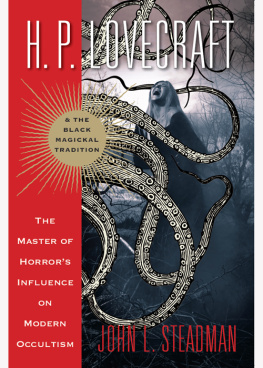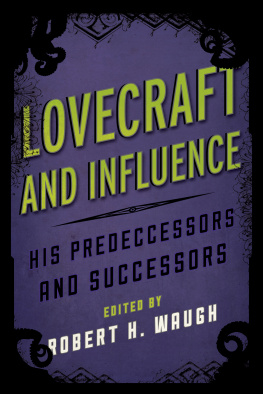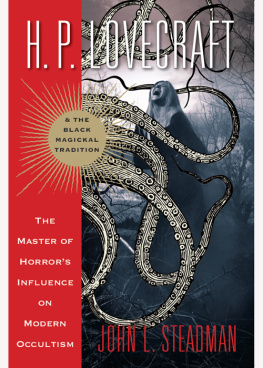Howard Lovecraft - The Alchemist
Here you can read online Howard Lovecraft - The Alchemist full text of the book (entire story) in english for free. Download pdf and epub, get meaning, cover and reviews about this ebook. genre: Science fiction. Description of the work, (preface) as well as reviews are available. Best literature library LitArk.com created for fans of good reading and offers a wide selection of genres:
Romance novel
Science fiction
Adventure
Detective
Science
History
Home and family
Prose
Art
Politics
Computer
Non-fiction
Religion
Business
Children
Humor
Choose a favorite category and find really read worthwhile books. Enjoy immersion in the world of imagination, feel the emotions of the characters or learn something new for yourself, make an fascinating discovery.

- Book:The Alchemist
- Author:
- Genre:
- Rating:3 / 5
- Favourites:Add to favourites
- Your mark:
- 60
- 1
- 2
- 3
- 4
- 5
The Alchemist: summary, description and annotation
We offer to read an annotation, description, summary or preface (depends on what the author of the book "The Alchemist" wrote himself). If you haven't found the necessary information about the book — write in the comments, we will try to find it.
The Alchemist — read online for free the complete book (whole text) full work
Below is the text of the book, divided by pages. System saving the place of the last page read, allows you to conveniently read the book "The Alchemist" online for free, without having to search again every time where you left off. Put a bookmark, and you can go to the page where you finished reading at any time.
Font size:
Interval:
Bookmark:
The Alchemist
by Howard Philips Lovecraft
High up, crowning the grassy summit of a swelling mount whose sides are wooded near the base with the gnarled trees of the primeval forest stands the old chateau of my ancestors. For centuries its lofty battlements have frowned down upon the wild and rugged countryside about, serving as a home and stronghold for the proud house whose honored line is older even than the moss-grown castle walls. These ancient turrets, stained by the storms of generations and crumbling under the slow yet mighty pressure of time, formed in the ages of feudalism one of the most dreaded and formidable fortresses in all France. From its machicolated parapets and mounted battlements Barons, Counts, and even Kings had been defied, yet never had its spacious halls resounded to the footsteps of the invader.
But since those glorious years, all is changed. A poverty but little above the level of dire want, together with a pride of name that forbids its alleviation by the pursuits of commercial life, have prevented the scions of our line from maintaining their estates in pristine splendour; and the falling stones of the walls, the overgrown vegetation in the parks, the dry and dusty moat, the ill-paved courtyards, and toppling towers without, as well as the sagging floors, the worm-eaten wainscots, and the faded tapestries within, all tell a gloomy tale of fallen grandeur. As the ages passed, first one, then another of the four great turrets were left to ruin, until at last but a single tower housed the sadly reduced descendants of the once mighty lords of the estate.
It was in one of the vast and gloomy chambers of this remaining tower that I, Antoine, last of the unhappy and accursed Counts de C-, first saw the light of day, ninety long years ago. Within these walls and amongst the dark and shadowy forests, the wild ravines and grottos of the hillside below, were spent the first years of my troubled life. My parents I never knew. My father had been killed at the age of thirty-two, a month before I was born, by the fall of a stone somehow dislodged from one of the deserted parapets of the castle. And my mother having died at my birth, my care and education devolved solely upon one remaining servitor, an old and trusted man of considerable intelligence, whose name I remember as Pierre . I was an only child and the lack of companionship which this fact entailed upon me was augmented by the strange care exercised by my aged guardian, in excluding me from the society of the peasant children whose abodes were scattered here and there upon the plains that surround the base of the hill. At that time, Pierre said that this restriction was imposed upon me because my noble birth placed me above association with such plebeian company. Now I know that its real object was to keep from my ears the idle tales of the dread curse upon our line that were nightly told and magnified by the simple tenantry as they conversed in hushed accents in the glow of their cottage hearths.
Thus isolated, and thrown upon my own resources, I spent the hours of my childhood in poring over the ancient tomes that filled the shadow haunted library of the chateau, and in roaming without aim or purpose through the perpetual dust of the spectral wood that clothes the side of the hill near its foot. It was perhaps an effect of such surroundings that my mind early acquired a shade of melancholy. Those studies and pursuits which partake of the dark and occult in nature most strongly claimed my attention.
Of my own race I was permitted to learn singularly little, yet what small knowledge of it I was able to gain seemed to depress me much. Perhaps it was at first only the manifest reluctance of my old preceptor to discuss with me my paternal ancestry that gave rise to the terror which I ever felt at the mention of my great house, yet as I grew out of childhood, I was able to piece together disconnected fragments of discourse, let slip from the unwilling tongue which had begun to falter in approaching senility, that had a sort of relation to a certain circumstance which I had always deemed strange, but which now became dimly terrible. The circumstance to which I allude is the early age at which all the Counts of my line had met their end. Whilst I had hitherto considered this but a natural attribute of a family of short-lived men, I afterward pondered long upon these premature deaths, and began to connect them with the wanderings of the old man, who often spoke of a curse which for centuries had prevented the lives of the holders of my title from much exceeding the span of thirty-two years. Upon my twenty-first birthday, the aged Pierre gave to me a family document which he said had for many generations been handed down from father to son, and continued by each possessor. Its contents were of the most startling nature, and its perusal confirmed the gravest of my apprehensions. At this time, my belief in the supernatural was firm and deep-seated, else I should have dismissed with scorn the incredible narrative unfolded before my eyes.
The paper carried me back to the days of the thirteenth century, when the old castle in which I sat had been a feared and impregnable fortress. It told of a certain ancient man who had once dwelled on our estates, a person of no small accomplishments, though little above the rank of peasant, by name, Michel, usually designated by the surname of Mauvais, the Evil, on account of his sinister reputation. He had studied beyond the custom of his kind, seeking such things as the Philosopher's Stone or the Elixir of Eternal Life, and was reputed wise in the terrible secrets of Black Magic and Alchemy. Michel Mauvais had one son, named Charles, a youth as proficient as himself in the hidden arts, who had therefore been called Le Sorcier, or the Wizard. This pair, shunned by all honest folk, were suspected of the most hideous practices. Old Michel was said to have burnt his wife alive as a sacrifice to the Devil, and the unaccountable disappearance of many small peasant children was laid at the dreaded door of these two. Yet through the dark natures of the father and son ran one redeeming ray of humanity; the evil old man loved his offspring with fierce intensity, whilst the youth had for his parent a more than filial affection.
One night the castle on the hill was thrown into the wildest confusion by the vanishment of young Godfrey, son to Henri, the Count. A searching party, headed by the frantic father, invaded the cottage of the sorcerers and there came upon old Michel Mauvais, busy over a huge and violently boiling cauldron. Without certain cause, in the ungoverned madness of fury and despair, the Count laid hands on the aged wizard, and ere he released his murderous hold, his victim was no more. Meanwhile, joyful servants were proclaiming the finding of young Godfrey in a distant and unused chamber of the great edifice, telling too late that poor Michel had been killed in vain. As the Count and his associates turned away from the lowly abode of the alchemist, the form of Charles Le Sorcier appeared through the trees. The excited chatter of the menials standing about told him what had occurred, yet he seemed at first unmoved at his father's fate. Then, slowly advancing to meet the Count, he pronounced in dull yet terrible accents the curse that ever afterward haunted the house of C-.
'May ne'er a noble of thy murd'rous line Survive to reach a greater age than thine!'
spake he, when, suddenly leaping backwards into the black woods, he drew from his tunic a phial of colourless liquid which he threw into the face of his father's slayer as he disappeared behind the inky curtain of the night. The Count died without utterance, and was buried the next day, but little more than two and thirty years from the hour of his birth. No trace of the assassin could be found, though relentless bands of peasants scoured the neighboring woods and the meadowland around the hill.
Font size:
Interval:
Bookmark:
Similar books «The Alchemist»
Look at similar books to The Alchemist. We have selected literature similar in name and meaning in the hope of providing readers with more options to find new, interesting, not yet read works.
Discussion, reviews of the book The Alchemist and just readers' own opinions. Leave your comments, write what you think about the work, its meaning or the main characters. Specify what exactly you liked and what you didn't like, and why you think so.



